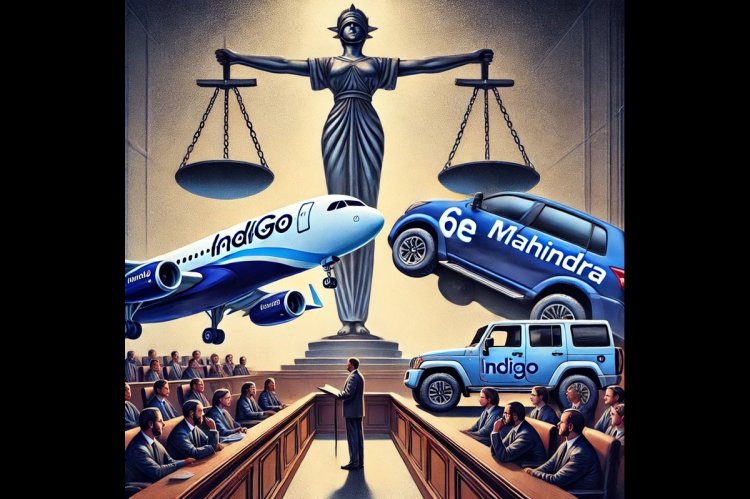IndiGo Sues Mahindra for Trademark Infringement Over '6E' Branding; Automaker Responds
This article examines the trademark dispute between IndiGo Airlines and Mahindra & Mahindra over the use of "6E" branding. IndiGo, a prominent airline, claims that Mahindra's use of the mark for its SUVs infringes on its trademark, potentially diluting its brand value and causing consumer confusion. The article delves into the legal grounds of the lawsuit under the Trademarks Act, 1999, Mahindra's defense arguments, and the broader implications for branding and intellectual property law. Expert opinions and lessons for businesses emphasize the importance of thorough trademark research and proactive IP management in a competitive, cross-industry market.

1. Introduction
In a recent legal development, IndiGo Airlines has filed a lawsuit against Mahindra & Mahindra for alleged trademark infringement concerning the use of "6E" branding. This case has sparked discussions about the boundaries of trademark enforcement across unrelated industries, such as aviation and automobile manufacturing. Trademarks serve as critical assets in competitive markets, providing brands with distinct identities and safeguarding their reputations. Here, IndiGo claims that Mahindra’s use of "6E" in its SUV range could potentially mislead consumers or dilute the airline's well-established brand value.
2. Background of the Case
IndiGo, one of India’s largest airlines, has trademarked "6E" as part of its brand identity, a shorthand for its flight codes and a reflection of its customer-centric approach, epitomized by its tagline "Go 6E." Meanwhile, Mahindra, a leading automobile manufacturer, has introduced the "6E" branding in its latest series of SUVs, emphasizing technological advancements and comfort.
Both brands enjoy strong market positions, with IndiGo dominating the skies and Mahindra excelling in the automotive sector. However, the overlap in branding has led IndiGo to claim that its rights over "6E" are being infringed upon, a matter that now awaits judicial review.
3. Legal Grounds for IndiGo’s Lawsuit
IndiGo asserts that Mahindra’s use of "6E" constitutes trademark infringement under Indian law. Trademark protection in India is governed by the Trademarks Act, 1999, which safeguards registered marks from unauthorized use that could lead to confusion or brand dilution.
Trademark Dilution: The potential weakening of IndiGo’s distinctive brand identity if "6E" becomes associated with Mahindra’s vehicles.
Likelihood of Confusion: While the industries differ, IndiGo argues that the overlapping branding might mislead consumers.
4. Mahindra’s Response
Mahindra has responded to the allegations by highlighting the stark differences between the airline and automobile industries. The automaker claims that its use of "6E" is unrelated to IndiGo’s branding and is intended to symbolize specific features of its SUVs.
The company’s defense hinges on two primary arguments:
The branding decision was made independently and does not infringe upon IndiGo’s trademark.
To know more about trademark infringement you can follow the link below:
5. Key Legal Questions
This case raises several critical questions:
Is "6E" generic or uniquely associated with IndiGo?
The court must determine whether the mark has acquired a secondary meaning tied solely to IndiGo.
Can a trademark be enforced across unrelated industries?
Indian courts have previously ruled on similar cross-industry disputes, but outcomes often depend on evidence of consumer confusion or dilution.
Precedents in trademark law: Both national and global case laws will likely influence the judgment.
6. Implications for Both Parties
For IndiGo: A favorable judgment could reinforce its brand and set a precedent for stronger IP enforcement.
For Mahindra: The lawsuit could pose reputational risks and financial liabilities if the court rules in IndiGo’s favor.
Wider Impact: This case could influence how businesses approach branding strategies, particularly in terms of trademark research and cross-industry considerations.
To know about Comparison of both the logo you can look below:
VS
7. Expert Opinions
Legal and branding experts have weighed in on the dispute:
Trademark Law Specialists: Highlight the challenges of enforcing trademarks in unrelated industries and the importance of distinctive branding.
Marketing Professionals: Stress the need for careful selection of brand elements to avoid potential conflicts.
Possible Outcomes: The court may rule in favor of IndiGo, dismiss the case, or recommend an amicable settlement.
8. Lessons for Businesses
Comprehensive Trademark Research: Ensures that branding decisions do not conflict with existing marks.
Cross-Industry Considerations: Companies must evaluate how their branding might intersect with other sectors.
Proactive IP Management: Regular audits and consultations with IP professionals can mitigate risks of disputes.
9. Conclusion
The IndiGo-Mahindra case underscores the evolving complexities of trademark law in a globalized and diversified market. As industries overlap and brands strive for distinctiveness, safeguarding intellectual property becomes paramount. This legal battle serves as a reminder of the importance of strategic branding and IP management in today’s competitive landscape.
Stay tuned for updates as this case progresses, offering insights into the dynamic interplay of law, branding, and business strategy.












